Book contents
- Frontmatter
- Acknowledgement
- Contents
- List of Cases
- List of Abbreviations
- List of Contributors
- PART I INTRODUCTION
- PART II EUROPE
- PART II BEYOND EUROPE
- PART III THE SUPRANATIONAL PERSPECTIVE
- PART IV LEGAL PRACTICE PERSPECTIVE
- PART V INTRADISCIPLINARY ANALYSIS AND REFORM RECOMMENDATIONS
- Key Source Bibliography
- Index
- About the Editors
Securities Litigation Against VW and Porsche: The 10 Billion Euro Marathon Walk
Published online by Cambridge University Press: 22 December 2020
- Frontmatter
- Acknowledgement
- Contents
- List of Cases
- List of Abbreviations
- List of Contributors
- PART I INTRODUCTION
- PART II EUROPE
- PART II BEYOND EUROPE
- PART III THE SUPRANATIONAL PERSPECTIVE
- PART IV LEGAL PRACTICE PERSPECTIVE
- PART V INTRADISCIPLINARY ANALYSIS AND REFORM RECOMMENDATIONS
- Key Source Bibliography
- Index
- About the Editors
Summary
INTRODUCTION
The focus of this chapter is to share experiences made with the securities litigation of investors against Volkswagen AG (‘VW’) and Porsche Automobil Holding SE (‘PSE’) in Germany. The following is only a snapshot and shall illustrate a few key issues of a complex case. The general procedural background regarding model case proceedings is explained (Section II.) and how Germany has become the forum of choice (Section III) before details of the VW/PSE securities litigation are touched upon, namely the procedural history (Section IV.A), the most relevant factual and legal issues of the case (Section IV.B) and latest developments (Section V). In view of the experiences made with the VW securities litigation to date1 the chapter ends with conclusions on the case and the enforcement of capital markets law in general (Section VI).
KAPMUG: THE GERMAN DEVICE FOR MASS PROCEEDINGS
Germany's procedural device for collective redress in capital markets law matters, the Capital Markets Model Case Act (Kapitalanleger-Musterverfahrensgesetz – KapMuG), entered into force in 2005, was amended in 2012 and was originally prompted by the Deutsche Telekom case with 17,000 claims filed by investors – a scenario that the German courts were unable to cope with at that time. The KapMuG was hence specifically enacted to streamline mass securities and other financial market-related claims in one single proceeding. For a KapMuG proceeding a minimum of ten financial market claims have to be brought by individual claimants in the Regional Court (Landgericht – LG), alleging substantially the same facts, known as Lebenssachverhalt. If a defendant or a plaintiff applies for the establishment of a model case, the Regional Court shall publicly announce the application for the establishment of the model case pursuant to section 3(2) of the KapMuG in a so-called Complaint Registry. If ten such admissible applications have been announced in total and within six months after the first announcement, the Regional Court shall then, pursuant to section 6(1) of the KapMuG, refer the matter to the Higher Regional Court (Oberlandesgericht – OLG) for the establishment of a model case.
- Type
- Chapter
- Information
- Enforcing Consumer and Capital Markets LawThe Diesel Emissions Scandal, pp. 449 - 462Publisher: IntersentiaPrint publication year: 2020

